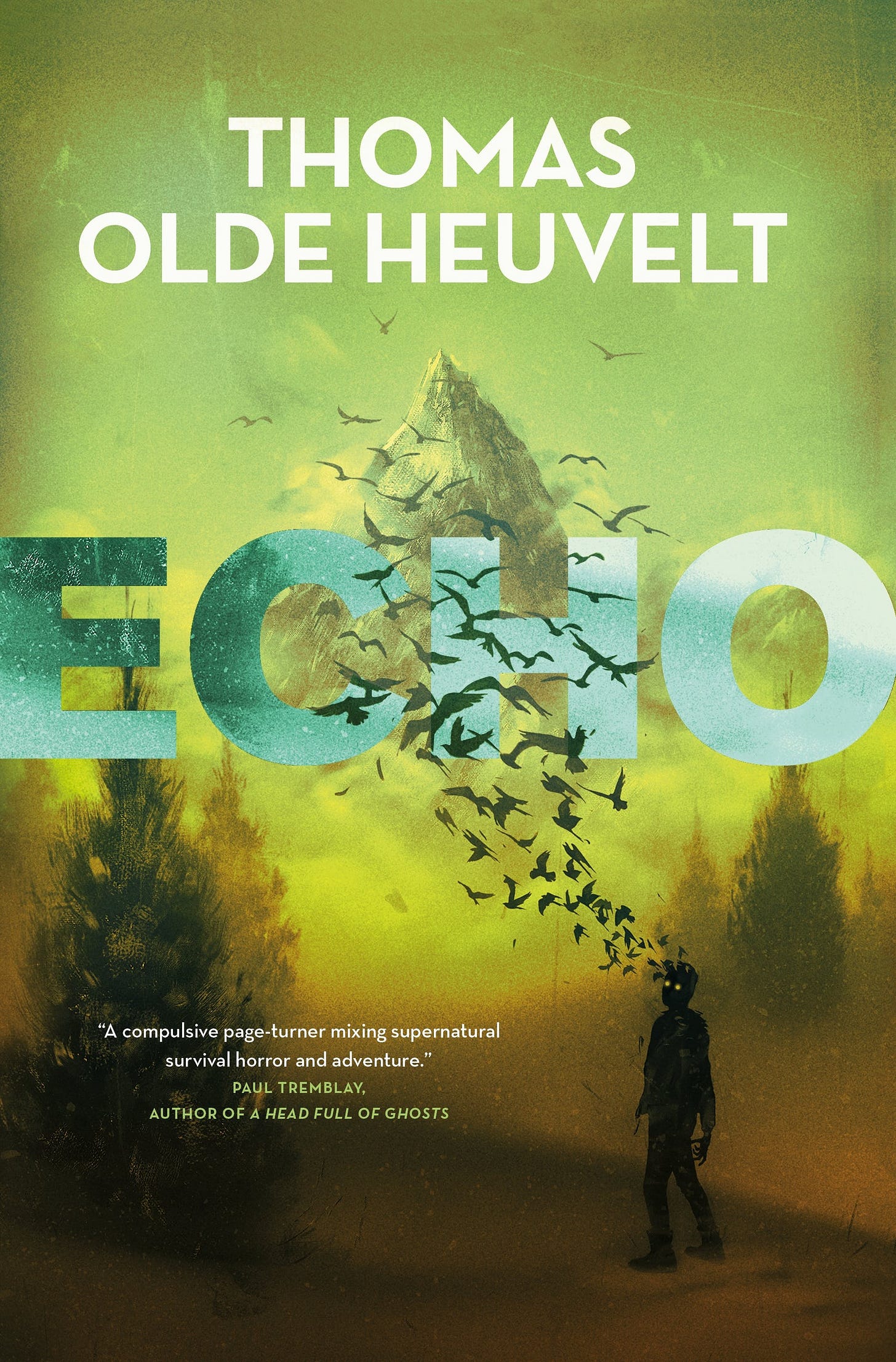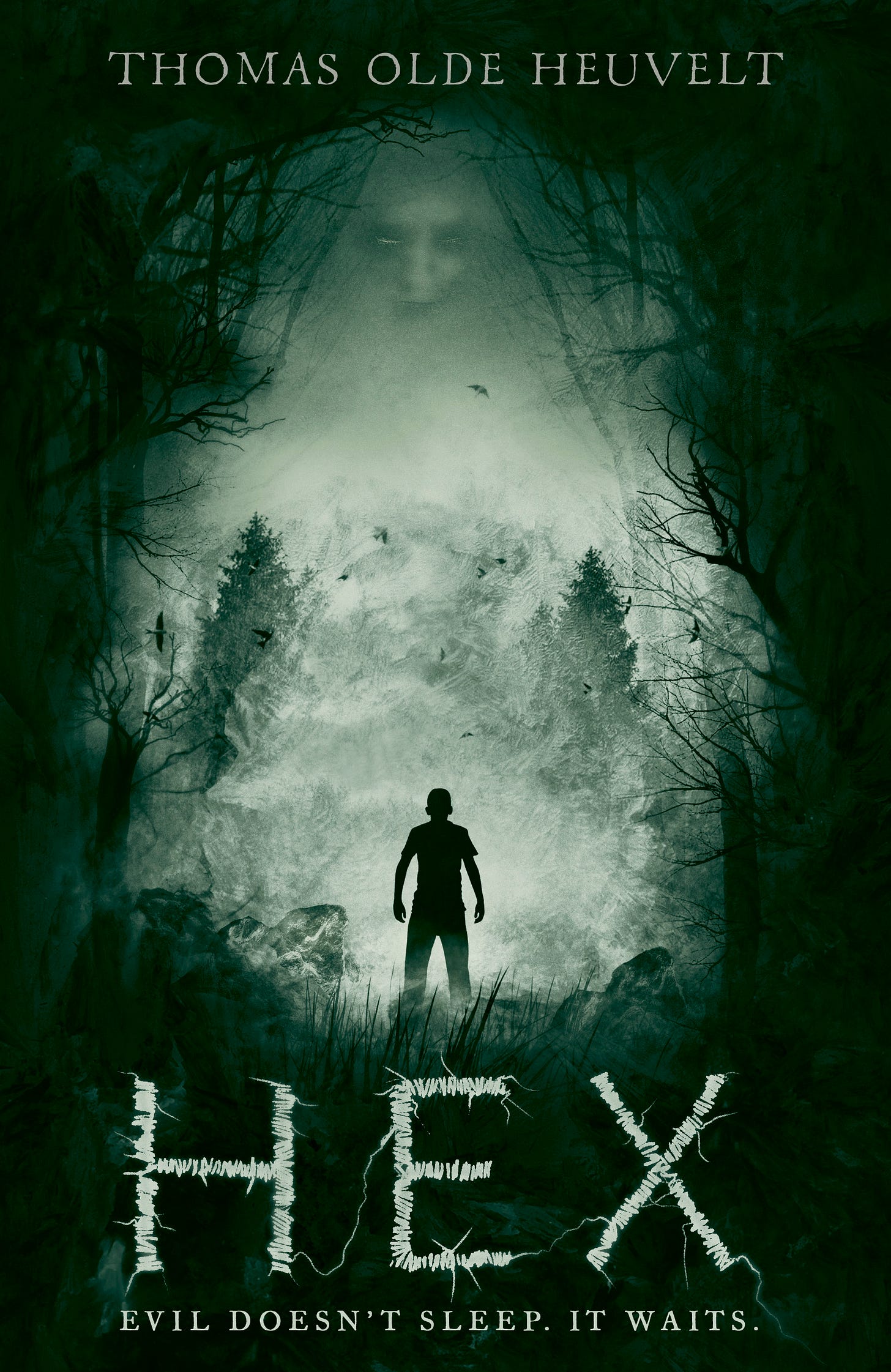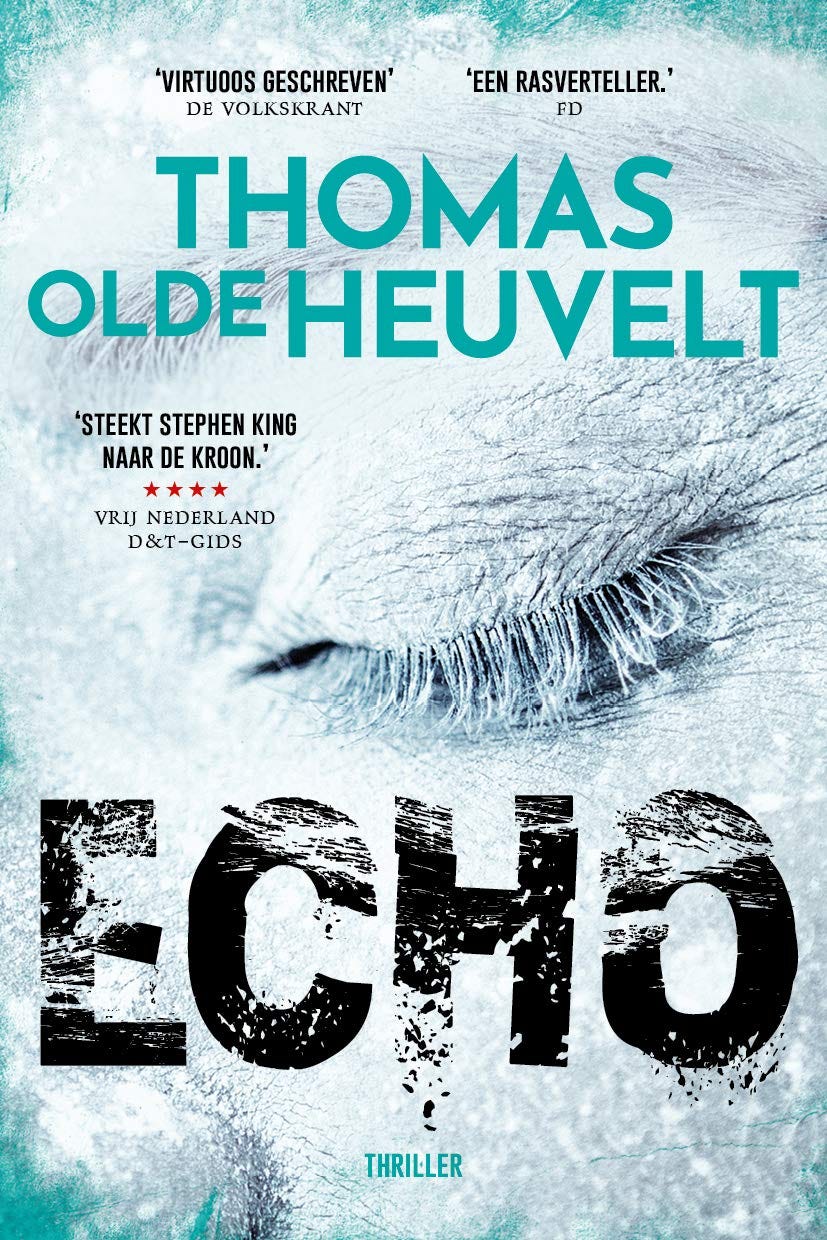Stephen King’s influence on several generations of horror fans is such that he can change the fortunes of an author’s career with a few approving words. For Thomas Olde Heuvelt, those words came in the form of a tweet from the Master shortly after the 2016 publication of the Dutch author’s debut novel in English, Hex. King’s praise ignited a firestorm of buzz, making Hex one of the most talked-about horror novels of the year.
Hex tells the story of a contemporary American village (it is a Dutch village in the original) haunted by a witch put to death in the 17th century. Though the ancient villagers sewed her eyes and mouth shut, the witch returned from the dead and returned to her home village, where she remains an integral part of life, appearing seemingly at random in people’s houses or on the roadside. (She also forces anyone who leaves the village for more than a few days to commit suicide.) The modern residents cope as best they can, equipping villagers with a witch-spotting phone app and dissuading outsiders from moving in. Eventually, all hell breaks loose.
Olde Heuvelt is back with an epic new novel, Echo, the story of a mountaineer who returns from a climbing expedition with grotesque facial wounds and powers that hint at some form of possession. Beneath the doomed mountaineer’s bandages a timeless presence lurks, one that dares us to peel back the protective mask and look horror in the face. And of course, we do…
The Veil: How did you become a horror fan?
Thomas Olde Heuvelt: I grew up with storytellers. I think it’s one of the great goods that you can do in life is to tell stories to children. My uncle was a storyteller and my grandfather was a storyteller, and both of them told stories that were not really suitable for children! They were Raold Dahl-esque stories. My grandfather told stories from the heart—he didn’t read them first, he just made them up. They were always a little bit creepy, a little bit mean. My uncle told me stories that he had read. So when I was seven he told me the story of Roald Dahl’s The Witches, and then Dracula when I was eight and the entire Lord of the Rings saga when I was nine.
The Veil: He read you all of The Lord of the Rings?
Thomas Olde Heuvelt: No, he told me his version of the three novels. I lived in the east of the Netherlands and my uncle lived in Amsterdam, so my sister and I would often spend the weekend at his house. At bedtime, he would just sit on the edge of the bed in the dark and he would tell the story almost like a TV series, with foreshadowing and cliffhangers at the end of every section. I was completely hooked but I was also terrified! When he told us The Witches, I saw witches everywhere. When I heard Dracula, I saw vampires everywhere. I was terrified, but I loved it as well.
At the same time, you have to know that we went to my uncle’s house to give my mom a break. My father had died quite young, when I was three years old, so whenever she needed some time to herself, my mom was happy to deliver us to my aunt and uncle’s house. So in my household, death was always this presence that, as a child, I visualized in a very “lively” way. Death lived in the attic. It lived in the washing bin. I visualized death as a dark hole that, if I made too much noise, would come down the stairs and grab me or my sister or my mom. I soon realized that the only way to make sense of these feelings was to put them into my own stories. That’s why I started writing stories, always with this dark and mean edge to them.
The Veil: I assume you discovered Stephen King around that time.
Thomas Olde Heuvelt: Yes. As a kid, I was dependent on books in translation because in the Netherlands we don’t really have a tradition of the fantastic in our literature. Certainly there’s no tradition of horror fiction. The writers that were translated into Dutch at that time were Stephen King, Peter Straub, Clive Barker, Dean Koontz, and, later on, Neil Gaiman. At age eleven I read my first Stephen King novel: Pet Sematary. I had been nagging at my mom to let me read one of his novels. I’d say, Please let me read one, I’m old enough! And she’d say, No, you’re not. So I showed her Pet Sematary and said, Look, this one has a nice kitty on the cover, it can’t be too bad! So she agreed. That book really hit a nerve with me. I wondered if you had that opportunity, in your grief, to bring back someone you love from the dead—of course it hit a nerve for me, and of course I would have done it. You would do it even if you knew the consequences would be horrible.
The Veil: Why do you think there is no tradition of the fantastic and the supernatural in the Netherlands?
Thomas Olde Heuvelt: Our literature is very Calvinistic, very down to earth. We have a lot of interior monologues. I like American storytelling. The literature is more plot-driven, and not just horror and science-fiction. With almost all of American literature you have more of an emphasis on plot.
The Veil: You mentioned Raold Dahl’s The Witches earlier. It got me to thinking about how in Hex you made the figure of the witch terrifying to a contemporary readership. I thought that was quite an accomplishment, because it’s not like witches are any kind of real threat to us, not like, say, a serial killer. Witches don’t really appear outside of children’s books much anymore, and if they do, they are usually historical figures, as in The VVitch film. When you were writing Hex, were you channeling those earlier fears of witches from your childhood or were you self-consciously taking up the challenge of making the witch frightening to a contemporary readership?
Thomas Olde Heuvelt: Both. It’s interesting. Hex has been published in thirty countries now—in the east, the west, the south, wherever—and people, no matter what culture they come from, all respond to the same fear: that sense of superstitious fear of waking up in the middle of the night and seeing a shape in your bedroom. It’s the way the witch behaves that frightens people, how she just shows up in people’s houses at random and stands there for days on end, not saying anything, not seeing anything, but still aware.
The challenge for me was to make the witch scary even after you’ve seen her. You know how it works in horror movies: when the monster is revealed, it loses its power. You see the claws and the red eyes and all that, and it was not as scary as what was suggested. But in Hex, you see the witch on page one. She’s always there. Of course, I don’t show her eyes, so you don’t know what she really wants, but what made it work, for me at least, was when I realized that the people in the town weren’t really scared of her. They were too used to her, too familiar to be scared, so when she appears they hang a dish towel over her face and read the paper or take a shower. That behaviour, because it’s so odd, really made the book tick for me. At the same time, they are afraid of her, under the skin. They have a dread of that moment when her eyes might open.
The Veil: That’s very Calvinist, the sense of a collective sin from the remote past that, if it ever fully revealed itself, if it opened its eyes and looked at you, would be unbearable.
Thomas Olde Heuvelt: Exactly. The villagers’ response is also, in a sort of Dutch way, very practical. I was raised to value being practical. My mother is a very practical person. Whenever we went on holidays, she had lists made and bags packed weeks in advance. Whenever I have a problem in life, I can go to her and she will have a list of solutions for me. Because I was raised that way, I had the people in Hex behave in a very practical way whenever the witch appears. If she appears on an open road where outsiders might see her, they put a shrubbery in front of her or a toolshed over her.
The Veil: What was it like to have your first debut novel in English make such an impact? Did the attention and success distract you from your normal writing routine?
Thomas Olde Heuvelt: Definitely. Funnily enough, when Hex came out in the Netherlands, it was not a huge bestseller. It sold well, but when it came out in English in the States and Stephen King tweeted about it... I went on tour in the States and got lots of publicity—then the Dutch media jumped all over the book and invited me on all the late-night talk shows. Then it became a bestseller in my own country. Now it’s published all over the world and there’s a TV series in the works. It’s fantastic! But there’s also the sense that, when you’re dreams come true, it paralyzes you in a way. The metaphor I use in Echo is about mountains. I am a mountaineer, and when you want to climb a mountain, the mountain acquires a certain kind of magic, it holds power over you, it casts a spell. You work sometimes for months in advance to prepare and then you finally approach the mountain and climb it. But from the moment you stand on its summit and literally pick up the summit rock—then you immediately see another mountain in the distance that is higher or more difficult. I basically approach everything in life that way, not only mountaineering but writing. So when Stephen King and all these people started praising Hex I was like, That’s cool, but how am I ever going to top that? I need to do something bigger and better and grander for my next book. And yes, for a while that froze me.
The Veil: Echo is full of lore about mountains and mountaineering. There’s also some really gruesome descriptions about all the ways you can die on a mountain.
Thomas Olde Heuvelt: Those are all true!
The Veil: And yet you remain a mountaineer! How did you get into mountain climbing?
Thomas Olde Heuvelt: When my dad was still alive, he and my mother loved going to the Alps. After he died, my mother kept returning for visits with us. So we started hiking in the Alps, and at some point, around the age of twelve, I wanted to go beyond where the trail ended. My mom said okay but told me I had to take some mountaineering courses, which I did.
The Veil: In Hex, you were playing with the tropes of the witch. Was there a guiding idea for Echo?
Thomas Olde Heuvelt: When I get ideas for a novel, they are usually about playing with a traditional horror trope in a very modern way. In Echo, I was playing with the idea of possession. I love possession stories, but one thing I don’t like is that they always have a religious angle. I think possession can be so much bigger than that, even if you call it obsession, which is the same thing practically. You can be possessed by almost anything. Based on my experience in the Alps, I thought it would be cool to have a guy who is possessed by the mountains. When I approached that idea, it became very much a Gothic story.
In those classic Gothic stories they talk about the grandness of nature, the experience of being awestruck by sublime when you are confronted with something bigger than yourself in nature, whether it’s the ocean or a mountain-scape or the vast skies around you. Echo very much has that quality. At one point in the book, Nick [the mountaineer who becomes possessed] says that when you are standing in front of the mountain you feel like a grain of sand in the palm of a hand. It diminishes you, puts you in a state of awe. I wanted to play with that. I wanted Echo to be my love letter to the Gothic story, which is why it is structured narratively in the form of diary entries, letters, emails and why it honours the classics in the genre by naming the chapters after the genre classics and putting in a summary of what happens in the chapter.
The Veil: So much of the appeal of horror is the unveiling experience or cathartic experience of seeing a monster or supernatural entity, whether it’s a ghost or a demon or a spirit. It’s that feeling of losing control as you are overwhelmed by something. In Echo, you are very much tapping those feelings, through the story by also, as you say, by paying homage to the great Gothic writers. You also reference Arthur Machen and Algernon Blackwood, who were very influenced by mystical and nature-based experiences of awe. Have you had that kind of experience in the mountains, that sense of something awesome being unveiled before you?
Thomas Olde Heuvelt: I am not a religious person. I was not raised with religion. But when I’m on a mountain—and I’ve heard other mountaineers speak about this—I always have that sense that the mountain has some kind of soul and that there is a definite presence there. Monks and gurus and seers come down from the mountains with stories of meeting the divine or God up there. To me, you don’t have to be a seer to experience that presence in the rock and the ice around you up in the mountains. As a mountaineer, you touch base with that every time you go there. Each particular mountain seems to have a particular soul, different from another. Some of are very welcoming and gentle, others are very hostile, like they don’t want you to be there.
My rational mind explains this as me, this tiny person, being in a hazardous place with dozens of things that will kill you if you don’t watch out, but at the same time there seems to be something more than just that. I thought that experience made for a great metaphor because as a mountaineer you are possessed by or obsessed with the mountain, you don’t want to abort the climb until you reach the summit and expel the mountain from you. And that is very much a kind of spiritual experience.
The Veil: You talked earlier about feeling frozen after for a while after the success of Hex. Does it feel good to be past that now?
Thomas Olde Heuvelt: Yes. One of the things that helped me get past that was, in 2016, I went to Santa Fe in New Mexico on my book tour and met George RR Martin. He has a cinema in Santa Fe where he invites writers to do readings. When I was there I asked how he deals with the pressure of success, because obviously the Game of Thrones series has surpassed the amount of books he’s published. He said the only thing you can do if you experience that is to go back to the very beginning when you started out as a writer, when it didn’t matter if you had a hundred or a thousand or a hundred thousand readers. It was just you and the story in an attic room and had fun with it. That was the key part, he said, to have fun with it. To hear someone like George Martin say that: it moved something in me. So I went home, and I don’t think I’ve had that much fun writing as I did with Echo, and then with Oracle, my next book [which will be coming out in English next year]. It was great.








I was astounded by HEX and the hype was certainly justified. It was inevitable that I would pre-order ECHO which I collected last week.. I’ve just started I AM LEGEND by R. Matheson and can’t wait to start ECHO once I finish that. Thanks for a great interview.
Thanks so much for this great interview. I read Hex awhile ago, and many on Books of Horror (Facebook) have been commenting on it lately. I read so much that I couldn't begin to recall the plot, although I remember enjoying the novel, but after reading your post here, I do recall it quite vividly. Now I must find Echo, even though mountain climbing is not one of my favorite things. Mr. Heuvelt looks quite young, so we may have a lot of great new fiction in our future.